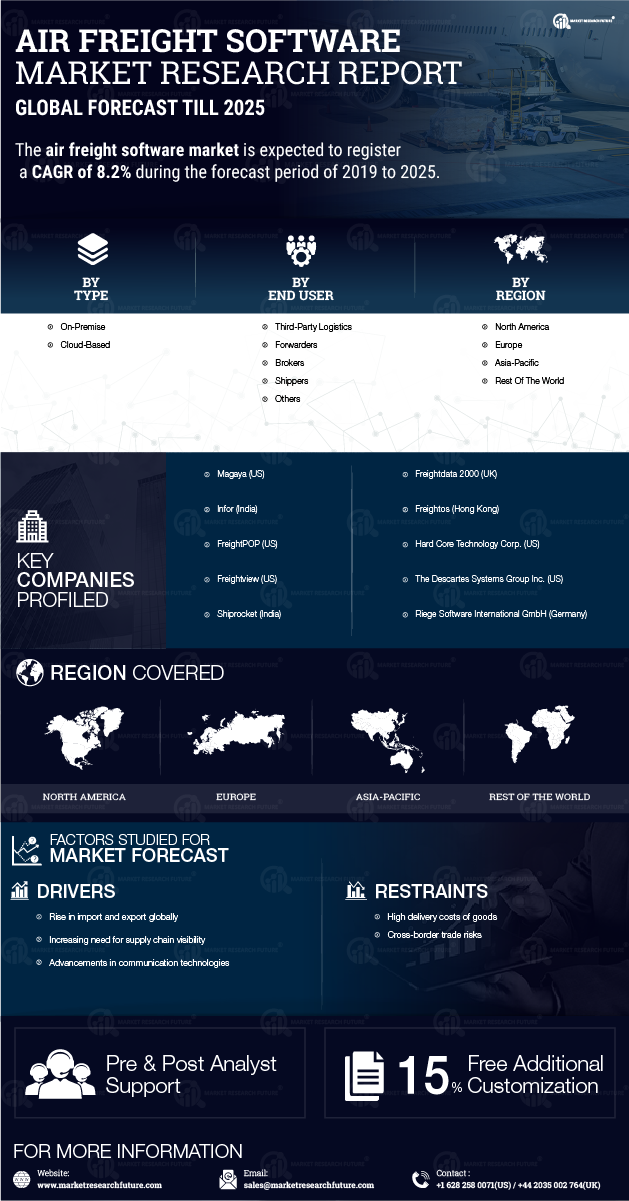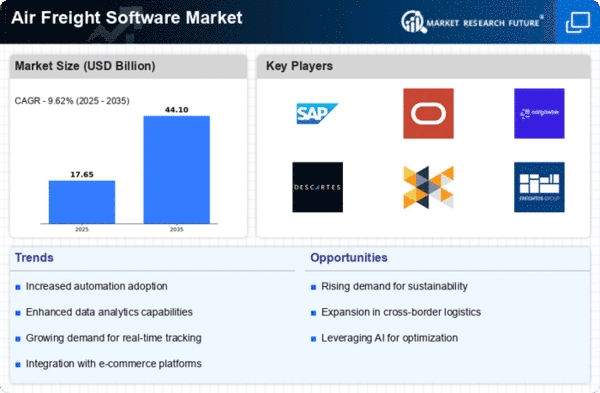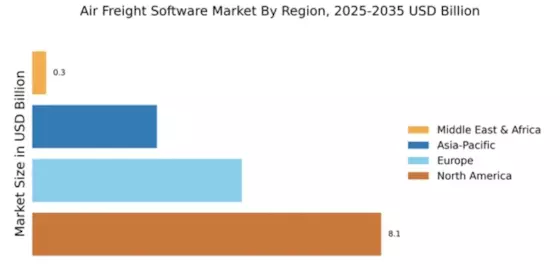Global Trade Growth
The expansion of global trade is a significant driver for the Global air freight software Industry. As countries engage in international trade, the demand for efficient air freight solutions rises. The increasing volume of goods transported across borders necessitates robust logistics management systems, which air freight software provides. In 2035, the market is projected to reach 9.09 USD Billion, underscoring the importance of air freight in supporting global commerce. This growth is fueled by trade agreements and economic partnerships that facilitate cross-border transactions, further driving the need for sophisticated air freight software to manage logistics effectively.
Regulatory Compliance
Regulatory compliance is an essential factor influencing the Global Air Freight Software Industry. As governments implement stricter regulations regarding safety, security, and environmental standards, companies must adapt their logistics operations accordingly. Air freight software assists businesses in navigating these complex regulatory landscapes by providing tools for documentation, reporting, and compliance management. This need for adherence to regulations is likely to drive investment in air freight software solutions, as companies seek to mitigate risks associated with non-compliance. The ongoing evolution of regulations will continue to shape the market, prompting software developers to innovate and enhance their offerings.
Market Growth Projections
The Global Air Freight Software Industry is projected to experience steady growth, with a market value of 6.63 USD Billion in 2024 and an expected increase to 9.09 USD Billion by 2035. This growth trajectory indicates a compound annual growth rate (CAGR) of 2.91% from 2025 to 2035. The increasing reliance on air freight for global trade, coupled with advancements in technology and regulatory compliance, suggests a robust future for the industry. The market's expansion reflects the ongoing evolution of logistics and supply chain management, driven by the need for efficiency and responsiveness in a dynamic global economy.
Sustainability Initiatives
Sustainability initiatives are increasingly becoming a focal point within the Global Air Freight Software Industry. As environmental concerns rise, companies are seeking ways to reduce their carbon footprints and enhance operational sustainability. Air freight software can facilitate more efficient routing, load optimization, and fuel management, contributing to lower emissions. This shift towards greener logistics practices is likely to influence purchasing decisions, as businesses prioritize software solutions that align with their sustainability goals. The growing emphasis on corporate social responsibility will drive demand for air freight software that supports environmentally friendly practices, shaping the industry's future.
Technological Advancements
Technological innovations play a crucial role in shaping the Global Air Freight Software Industry. The integration of advanced technologies such as artificial intelligence, machine learning, and blockchain enhances operational efficiency and transparency in air freight logistics. These technologies enable real-time tracking, predictive analytics, and automated processes, which are essential for managing complex supply chains. As companies increasingly adopt these technologies, the market is likely to experience growth. The anticipated compound annual growth rate (CAGR) of 2.91% from 2025 to 2035 indicates a sustained interest in leveraging technology to improve air freight operations and customer service.
Rising Demand for E-commerce
The surge in e-commerce activities globally is a pivotal driver for the Global Air Freight Software Industry. As online shopping continues to expand, businesses require efficient logistics solutions to meet consumer expectations for rapid delivery. In 2024, the market is valued at 6.63 USD Billion, reflecting the increasing reliance on air freight services to facilitate quick shipping. Companies are investing in air freight software to optimize their supply chains, ensuring timely deliveries and enhancing customer satisfaction. This trend is expected to persist, as the e-commerce sector is projected to grow, further propelling the demand for sophisticated air freight solutions.

















